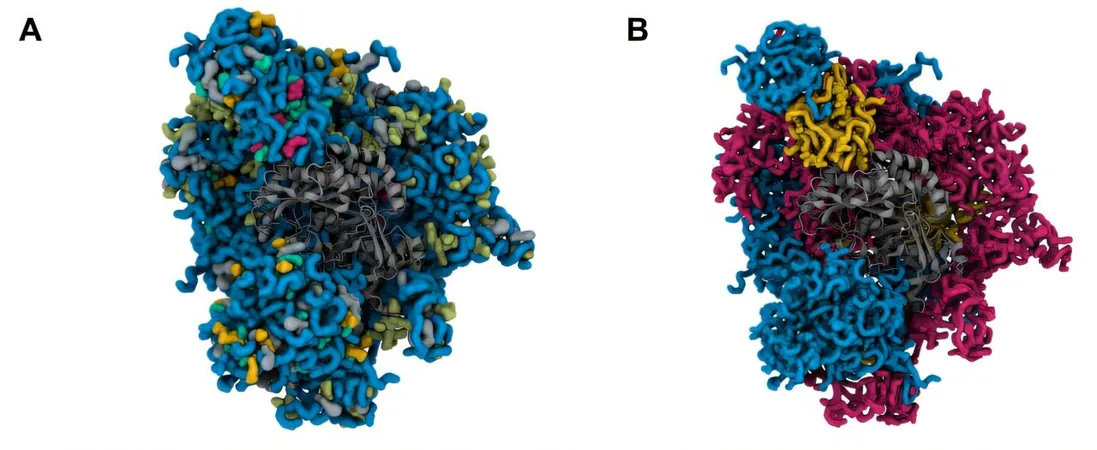
Unlocking the Secret: How Vitamin C Reverses Aging Skin at the DNA Level!
2025-06-29
Author: Ming
The Skin's Shield: Understanding Aging
The skin is our first line of defense, but as time ticks by, the epidermis—the outer layer—starts to thin and falters in protecting against external threats. This protective barrier largely consists of keratinocytes, which are vital for skin health.
Vitamin C: The Cellular Fountain of Youth
Renowned for its antioxidant properties, Vitamin C (VC) has long been celebrated for its skin-repairing skills. However, groundbreaking research reveals it has even deeper impacts at the genetic level.
A revolutionary study from Japan, published in the *Journal of Investigative Dermatology*, demonstrates that vitamin C can thicken the skin by reawakening specific genes, invigorating cellular regeneration through epigenetic modification.
Revolutionary Findings from Japan
Dr. Akihito Ishigami, a prominent figure at the Tokyo Metropolitan Institute for Geriatrics and Gerontology, led this fascinating research. He noted, “Vitamin C appears to significantly influence the epidermis's structuring and functioning, particularly in promoting the growth of epidermal cells.”
Vitamin C's Vital Role Explained
Also known as ascorbic acid, Vitamin C is essential for human health, serving as a potent antioxidant and a crucial player in numerous enzymatic reactions. It plays a vital role in collagen synthesis, the cornerstone protein that reinforces skin, blood vessels, and connective tissues. As humans cannot produce vitamin C internally, we must derive it from a diet rich in fruits and vegetables.
Additionally, this powerhouse nutrient fortifies the immune system and neutralizes free radicals, which could lower the chances of chronic ailments like heart disease and cancer.
How Does Vitamin C Thicken Skin?
Instead of testing on actual human skin, researchers engineered lab-grown models called human epidermal equivalents, which mimic real skin. In this controlled setup, the top layer is exposed to air, similar to real skin, while the bottom receives nutrients just as blood would nourish natural skin.
They introduced vitamin C in low and high doses and found that within a week, the living skin layer thickened, indicating a surge in cell growth. By day 14, both the living and outer layers showed observable changes, hinting that vitamin C significantly stimulates keratinocyte production.
Vitamin C Supercharges Cell Division!
The vitamin C-treated samples showcased higher levels of Ki-67-positive cells, indicators of active cellular division, and rapid skin regeneration.
Delving deeper, they uncovered that vitamin C catalyzes this effect by removing methyl groups from DNA, which typically serve to silence genes. By enabling gene activation, vitamin C promotes robust growth and repair of skin cells.
Reactivating Silenced Genes!
Key enzymes, known as TET enzymes, facilitate this DNA demethylation process, converting 5-methylcytosine to its more active form. This intricate process depends on iron, which vitamin C helps maintain in a reactive state, keeping skin's regenerating power at peak levels.
Changing DNA Activity and Structure
Support for these findings includes additional experiments highlighting how vitamin C enhances gene activation by improving chromatin accessibility—essential for the expression of growth-promoting genes.
Notably, genes associated with keratinocyte growth and skin structure organization, such as DLX5 and CXCL14, demonstrated significant upregulation post-vitamin C treatment.
The Aging Skin's Best Friend
The implications of this research are profound. Vitamin C may offer an innovative solution for revitalizing aging or thinning skin by reinitiating dormant growth pathways. Dr. Ishigami emphasizes, “Vitamin C promotes keratinocyte proliferation through DNA demethylation, making it a potential game-changer for older adults.
With this cutting-edge study and existing research, it’s clear that vitamin C's role in skincare is poised to shift from just an antioxidant to a key genetic rejuvenator!


 Brasil (PT)
Brasil (PT)
 Canada (EN)
Canada (EN)
 Chile (ES)
Chile (ES)
 Česko (CS)
Česko (CS)
 대한민국 (KO)
대한민국 (KO)
 España (ES)
España (ES)
 France (FR)
France (FR)
 Hong Kong (EN)
Hong Kong (EN)
 Italia (IT)
Italia (IT)
 日本 (JA)
日本 (JA)
 Magyarország (HU)
Magyarország (HU)
 Norge (NO)
Norge (NO)
 Polska (PL)
Polska (PL)
 Schweiz (DE)
Schweiz (DE)
 Singapore (EN)
Singapore (EN)
 Sverige (SV)
Sverige (SV)
 Suomi (FI)
Suomi (FI)
 Türkiye (TR)
Türkiye (TR)
 الإمارات العربية المتحدة (AR)
الإمارات العربية المتحدة (AR)